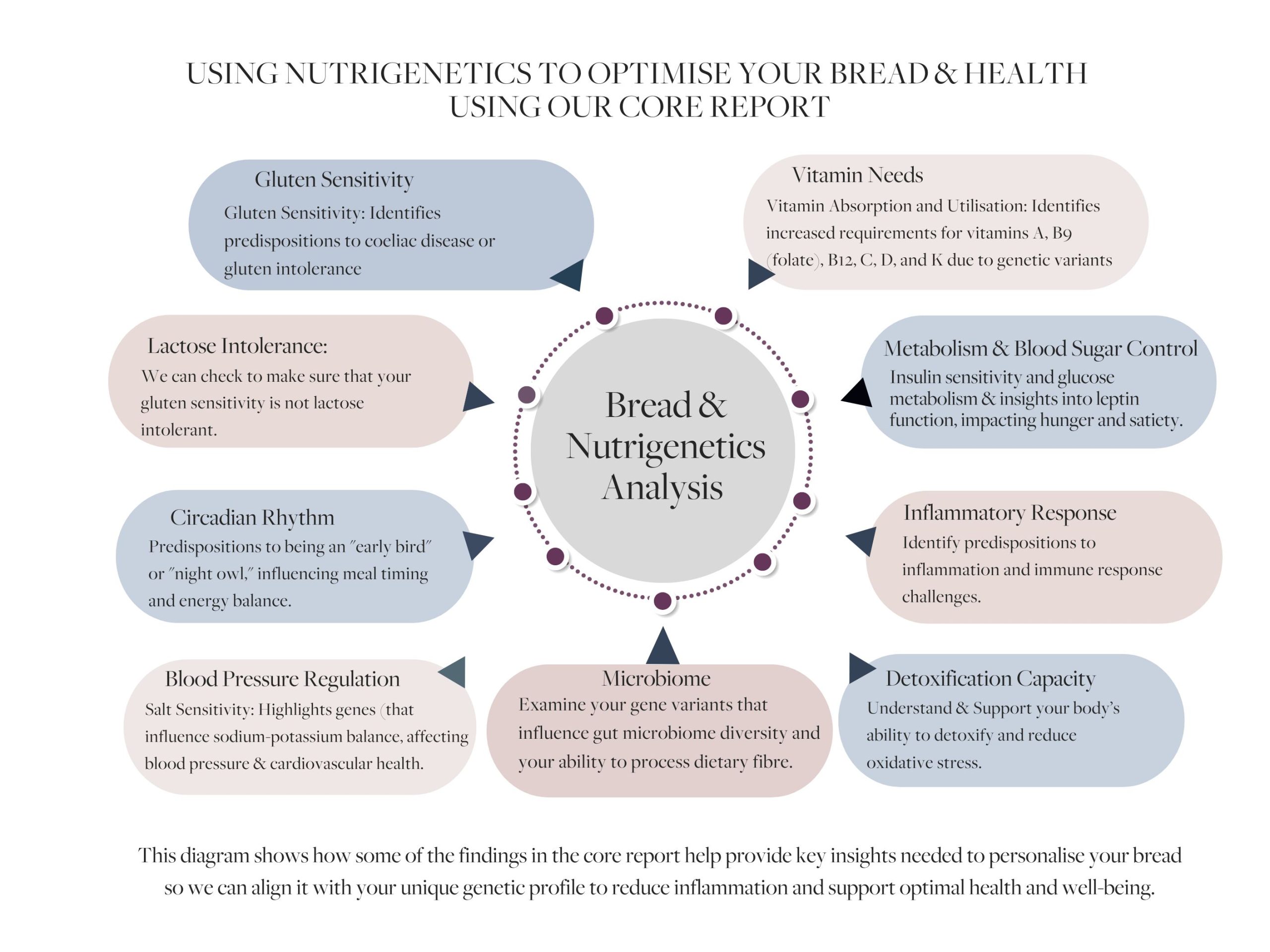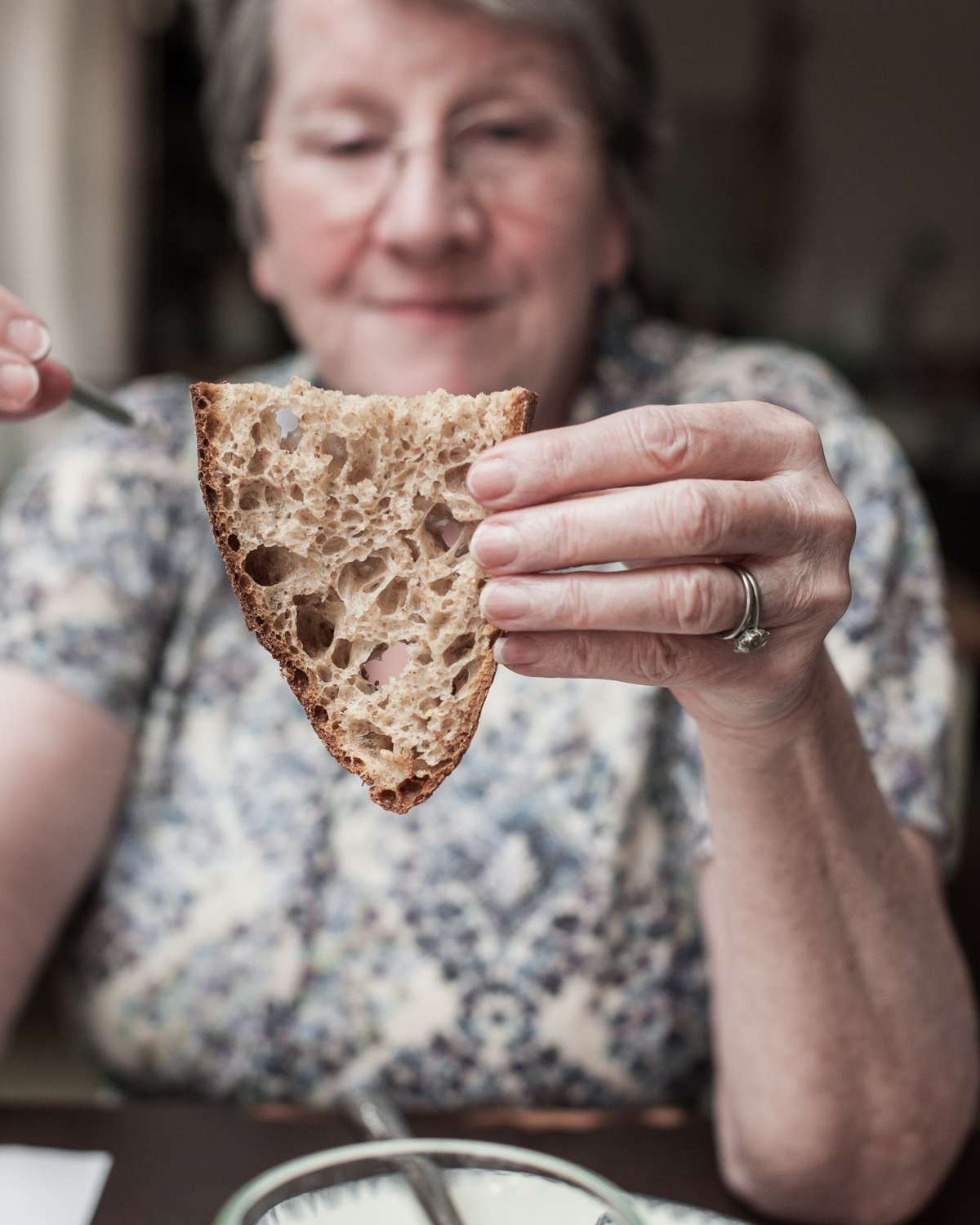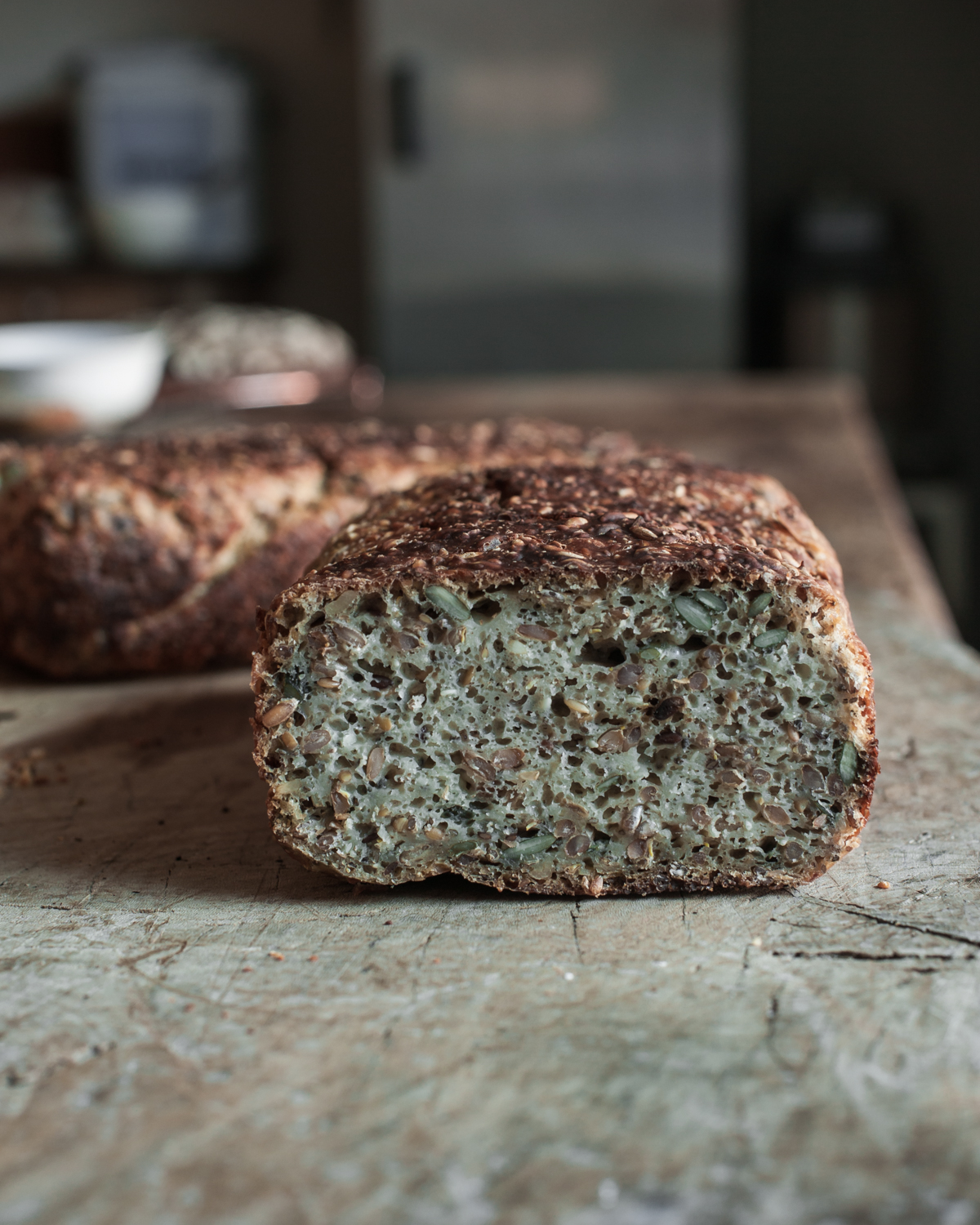This step-by-step process includes an initial consultation, genetic testing recommendations, custom bread recipe development, 12 weeks of symptom tracking, progress check-ins, and a final feedback session. Achieve better health through evidence-based nutritional strategies.
Nutrient Core Report (mandatory for first-time testing)
This is the foundation report and must be booked if you have not already completed it. If you already have your Nutrient Core results, you do not need to purchase it again — you may go straight to the optional add-on reports.
Optional Add-On Reports
Once you have your Nutrient Core Report, you may select additional reports recommended in your consultation email. These can be booked now or within six months of receiving your Nutrient Core results.
Do your genetics influence how your body processes bread? Let’s find out
How I use Nutrigenomics to bespoke your bread:
- Feel less bloated: Nutrigenetics will identify how I can personalise bread with ingredients tailored to your genetic ability to digest certain fibres and carbohydrates.
- Improved gut health: A nutrigenetic test will help me identify the grains and specific fermentation methods that align with your genetic predispositions, optimising your microbiome.
- More energy: Based on your unique results, we can design your genetic profile to support efficient energy metabolism and balanced blood sugar.
- Sleep better: We can ensure your bread contains nutrients that support neurotransmitters linked to restful sleep and use the process to lower cortisol and help balance your hormones.
- Improve overall health: By aligning how you eat your bread and the bread composition with your genetic needs and fibre requirements, we can enhance nutrient absorption and reduce inflammation.
- Reach a healthy weight: By tailoring bread and understanding your specific responses, we can make bread and design how you eat it to help regulate appetite and metabolism, working in harmony with your genetic blueprint.
- This course includes a 12-week BALM Support Pack (valued at £897) – designed to support you in mastering the art of baking as lifestyle medicine. With a comprehensive library of over 200 recipes, video lessons, and live support sessions, you’ll have access into every aspect of baking and nutrition—from caring for your starter, understanding levains, and exploring milling, to perfecting mixing, shaping, fermentation, and beyond. It’s like having me in your kitchen, guiding you through each step, helping you build confidence and skill as you practice and refine your craft at home, and in managing your approach to personalised bread
Bread is a daily staple, yet the kind of bread most people eat — ultra-processed, fibre-poor, and devoid of diversity — can quietly undermine wellbeing over time. When eaten every day, for years, this kind of bread may contribute to chronic inflammation, gut dysbiosis, poor blood sugar control, and even mental health challenges.
The nutrigenetics report allows me to personalise your bread to support your unique metabolic, digestive, and neurological needs by selecting ingredients and fermentation methods that align with your genetic profile. At The Sourdough School, this is a very a different approach. Our bread is developed as a therapeutic tool — part of a wider, evidence-based protocol that supports people living with real health concerns, including:
- IBS and digestive discomfort
- Fatigue and blood sugar imbalances
- Weight management and metabolic health
- Inflammatory bowel diseases
- ADHD, anxiety, and mood regulation
- Autoimmune conditions
- Cancer prevention and recovery support
- This is where the nutritional profile of bread really matters. Through fermentation, fibre, and diversity of ingredients, optimised bread becomes a powerful ally in supporting gut health, balancing the microbiome, and reducing systemic inflammation.
Most people don’t realise that the bread they eat every day could be either undermining their health — or helping to heal it. At The Sourdough School, we work with individuals who are managing real clinical conditions, and we support them through a 12-week programme that personalises bread and eating practices to their nutrigenetic profile, microbiome, and clinical history.

How Baking as Lifestyle Medicine, Tailored to Your Genetics, Becomes a Personalised Path to Better Health
IBS and Digestive Disorders
Many people with IBS or IBD struggle with bloating, cramping, or unpredictable bowel movements. For them, fast-fermented, refined breads can trigger inflammation and discomfort. In contrast, BALM breads are developed with long fermentation, diverse fibres, and lower FODMAP profiles — tailored to the individual’s tolerance. In the programme, we review symptoms weekly, adjust fermentation timing, and recommend bakes that support short-chain fatty acid production and gut barrier repair.
Fatigue and Low Energy
When we see fatigue, we often find low levels of B vitamins (especially folate or B12) or poor blood sugar regulation. If nutrigenetics shows MTHFR polymorphisms, we adapt recipes using ingredients rich in natural folate and ensure fermentation enhances bioavailability. BALM bread becomes a stable, nutrient-dense foundation that supports mitochondrial function and energy metabolism — no blood sugar crashes, no empty calories.
Weight Management and Insulin Resistance
Rather than remove bread, we optimise it. By increasing resistant starch through fermentation, and balancing macronutrients with wholegrain flours, seeds, and legumes, we slow glycaemic response. Students are taught how to time their bread intake using sequenced eating and to pair it with protein and polyphenol-rich foods, improving satiety and supporting sustainable weight change.
ADHD, Anxiety, and Mood Disorders
In students with mood-related symptoms or ADHD, we often find links to gut dysbiosis, poor methylation, and unstable blood sugar. BALM bread becomes part of a larger neuro-supportive plan: fermented breads rich in magnesium, zinc, and B vitamins, paired with fibre and live cultures to support the gut-brain axis. Over 12 weeks, students notice greater emotional stability, clearer thinking, and more consistent energy.
Autoimmune Conditions and Inflammation
Many autoimmune conditions are driven by chronic inflammation and microbiome imbalance. Personalised BALM bread avoids pro-inflammatory ingredients and incorporates grains, seeds, and fibres known to reduce gut permeability and support regulatory immune pathways. The 12-week programme gives space to monitor symptom flares, adjust diversity exposure, and gently increase tolerance over time.
Cancer Recovery and Prevention
In students with a cancer history or those seeking prevention, the focus is on polyphenols, wholegrain diversity, and reducing inflammation. Using botanical blends and therapeutic fermentation, we create breads that feed the microbiome, regulate insulin response, and support detoxification pathways — including gentle daily fibre support to aid oestrogen clearance and support immunomodulation.
Throughout the 12-week BALM intervention, we integrate weekly self-assessments and symptom tracking, recipe adaptation based on nutrigenetics and gut data, food diary reviews where indicated, live support sessions to troubleshoot symptoms and make clinical adjustments, and personalised baking guidance to support confidence and connection to food.
This isn’t a theoretical model — it’s clinical practice, adapted to the home kitchen. We teach individuals to bake bread that actively supports their healing process.
What if you could bake bread designed specifically for your unique nutritional needs? This is a functional nutritional approach to the bread. We use Nutrigenomic testing from Lifecode GX, which gives me personalised insights into your genetic makeup and how it influences your body’s response to bread and different nutrients. By working with you and understanding your unique genetic variations, I build comprehensive knowledge about your metabolism, nutrient needs, and potential risks of health problems and create healthy bread for you.
This personalised information, along with building an understanding of your digestion and lifestyle, means that I can create an approach to your bread that aligns perfectly with your body’s specific requirements because it is tailored to your unique genotype.
The extra tabs show the two main reports that we use; however, I will sometimes recommend additional reports following a consultation. Please see the additional Reposts tab for more information.
Disclaimer
The genetic insights provided through these reports are designed to support personalised nutritional and lifestyle recommendations. They are not intended to diagnose, treat, or cure any medical condition. Instead, they serve as a tool to optimise health by aligning dietary choices, including bread recipes, with your unique genetic blueprint.
While these reports offer valuable guidance in understanding how your body processes nutrients, responds to stressors, and supports metabolic functions, they should be used in conjunction with advice from a qualified healthcare professional.
The focus of this approach is nutrigenetics—the science of tailoring nutrition to individual genetic tendencies. It does not replace medical advice, and any concerns about health conditions or symptoms should always be discussed with your doctor or a licensed medical practitioner.
By exploring how food can work with your biology, these reports aim to empower you with knowledge to make informed, supportive choices for your overall well-being.





















